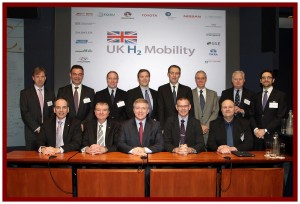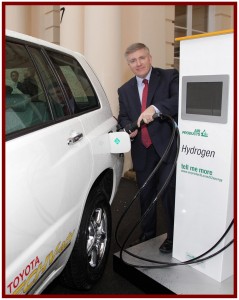
The real challenges come from energy storage and making the fuel. Costs are astronomically high – literally – for this space age technology.
Three UK government agencies have joined with industrial firms to smooth the transition to fuel cell electric vehicles, Business Minister Mark Prisk announced today. The group will evaluate the potential for hydrogen as a fuel for Ultra Low Carbon Vehicles in the UK, before developing an action plan for an anticipated roll-out to consumers in 2014-2015.
Dubbed UK H2 Mobility, the new consortium links The Department for Business, Innovation and Skills, The Department for Transport and the Department for Energy and Climate Change with 13 companies. All of the participants have signed a Memorandum of Understanding to agree to share their knowledge and expertise.
The allure of fuel cells remains efficiency, roughly 50-60% compared to an internal combustion engine’s ~20%. Emissions are also attractive – no pollutants at the tailpipe and some studies indicate a drastically reduced overall well-to-wheel emissions when compared with today’s fossil fuel engines.

Automakers are currently lobbying in the U.S. for tax breaks and incentives for fuel cell cars. Hyundai thinks it can develop a fuel cell business if it can get the costs down to ~$50,000 a vehicle.
Since hydrogen fuel cell electric vehicles share a large proportion of the electric motor and drivetrain technology with other electric and plug-in hybrid vehicles, the real challenges come from energy storage and making the hydrogen fuel. Costs are astronomically high for this space age technology. A fuel cell is an electro-chemical machine like a battery, but unlike a battery it does not need recharging. Refueling can also be a challenge since very high pressures are involved.
UK H2 Mobility will:
- Analyze the specific UK case for the introduction of hydrogen fuel cell electric vehicles as one of a number of solutions to de-carbonize road transportation and quantify the potential emissions benefits;
- Review the investments required to commercialize the technology, including refueling infrastructure; and
- Identify what is required to make the UK a leading global player in hydrogen fuel cell electric vehicle manufacturing, paving the way for economic opportunities to the UK, through the creation of new jobs and boosting of local economies.
The private firms appear to be – potentially – major players in a hydrogen-based auto economy: Air Liquide Hydrogen Energy, SA Air Products, Daimler AG, Hyundai Motor Company, Intelligent Energy, ITM Power, Johnson Matthey, Nissan Motor Manufacturing (UK), Limited Scottish and Southern Energy, Tata Motors European Technical Centre, The BOC Group, Toyota Motor Corporation and GM’s Vauxhall Motors.
”Fuel cell vehicles, storage and refueling technology are here today, they work,” said Dr Henri Winand, Chief Executive of Intelligent Energy. “We now need to look at how we can make these elements, together with the hydrogen refueling infrastructure, work most effectively to enable the UK to take full advantage of hydrogen as a transport fuel.”

